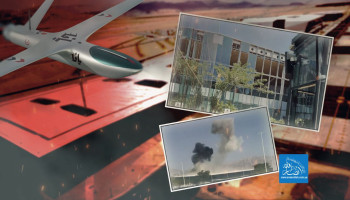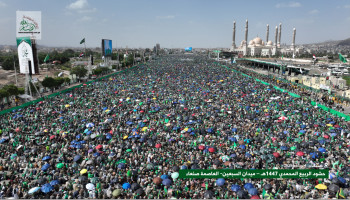Ansarollah website. Report
The intensity of Yemeni attacks on military and vital sites deep inside the Zionist entity has increased over the past few hours.
Following a large-scale operation carried out by the Yemeni Armed Forces' unmanned aerial vehicle, which Israel described as "the world's most advanced air defense systems," the Yemeni Armed Forces resumed a qualitative offensive operation using unmanned aerial vehicles on Monday evening.
The latest operation, according to a statement issued by the Yemeni Armed Forces on Monday, targeted Lod Airport in Jaffa, Ramon Airport in Umm al-Rashrash, and a sensitive target in the Dimona area with three drones.
The intensive operations by the Yemeni Armed Forces targeting the depth of the Zionist entity carry many implications at this sensitive time in the battle for the promised conquest and the holy jihad that Yemen has been waging in support of Gaza since October 2023.
The Yemeni offensive operations are taking on multiple dimensions, on the military, political, and economic levels.
The Hebrew newspaper Globes revealed in a report that the Yemenis are changing their offensive methods and that the threat of Yemeni drones has become an increasing threat. The newspaper considered the ability of a Yemeni drone to penetrate the defenses and strike Ramon Airport directly and without warning, and the flight of another drone in the airspace of occupied Palestine for a full half-hour, to be a development that reflects the changing methods of the Yemenis in choosing routes, timing of execution, and targets of attacks. This poses an escalating qualitative challenge for the enemy "army."
Globes confirmed that this is the second time during four months that the Yemenis have succeeded in hitting an airport inside "Israel", following the ballistic missile attack on Ben Gurion Airport in May. The recent Ramon incident is part of a clear Yemeni strategy to impose an air blockade on Israeli airports, at a time when "Tel Aviv" admits it is unable to prevent such attacks from recurring. It added that drones, unlike missiles, are small, low-altitude, easy to maneuver, and have a low radar signature, making their detection and interception extremely difficult.
The newspaper stated that the Yemeni attacks are no longer limited tactical operations, but have transformed into a strategic threat capable of hitting sensitive targets and directly impacting the Israeli economy and aviation sector. It indicated that defense systems such as Iron Dome and Shield Dome have demonstrated a partial ability to counter drones, but they were not primarily designed for this type of threat. Furthermore, the cost of operating fighter jets and helicopters to track drones is equal to or greater than the cost of simple Yemeni weapons, tipping the scales in the Yemenis' favor.
The newspaper concluded by emphasizing that the recent strikes represent a dangerous shift, and that Yemen's continued development of its tactics and escalation of its operations means that "Israel" faces a persistent threat with which it cannot coexist or normalize its existence.
New Equations
From a military perspective, the Yemeni operations confirm the fragility of the Zionist entity, and that the defeat of the military arsenal boasted by the Israeli enemy is possible. The military equation in the region has changed, and the United States and the Israeli enemy can no longer monopolize the initiative and force others to merely be a weak reaction to Zionist arrogance. This is especially true since Yemen has announced that it has many surprises in store for the coming period, indicating that Yemeni attacks on the Zionist entity will witness an evolution in both quality and quantity.
In this regard, the Hebrew newspaper Maariv published a report stating that a Yemeni drone struck Ramon Airport on Sunday, achieving a direct hit. This was followed on Monday by the launch of new drones, confusing warning systems in the south and forcing the occupation to announce the interception of some of them. Meanwhile, missiles fell in Eilat amid conflicting estimates about their nature, in an attempt to cover up the failure of air defenses. The newspaper added that Sunday's attack alone involved four drones launched from Yemen, one of which directly hit the Ramon Airport complex, shutting down the airport and halting air traffic. The newspaper considered this strike further evidence that Israeli defense systems are incapable of protecting vital airports, and that Sana'a continues to impose its deterrent equation, which confuses the enemy and exposes the fragility of its internal front.
The Palestinian Resistance Negotiators have a pressure Card
On the political level, military operations represent an effective means of pressure to curb the Israeli enemy's impulse to implement its malicious intentions to displace the people of Gaza or dictate its terms for ending its aggression against Gaza. Yemeni attacks and the ban on shipping ships bound for occupied Palestinian ports provide the Palestinian resistance with an important bargaining chip at the negotiating table.
The Hebrew newspaper "Israel Hayom" published remarkable statements made by the former commander of the Israeli Air Defense Directorate, Brigadier General (res.) Zvika Haimovich, in which he acknowledged the development of Yemeni capabilities and their transformation into an escalating strategic threat to the entity. He indicated that the Yemeni threat may appear tactical at first, but it has the potential to develop into a serious "strategic problem," citing the failure to intercept a missile that struck an area near Ben Gurion Airport and the widespread concern it caused. He explained that any direct hit on a strategic target, whether an airport or a vital facility, carries "the potential for enormous damage" to the entity, whether directly or indirectly.
Haimovich said, "The Houthis are learning and refining their operations," explaining that in recent years they have become capable of manufacturing their missiles and drones entirely within Yemen.
He added that the Israeli Air Force now faces a "multi-front air threat," requiring immediate 360-degree readiness. The threat no longer comes from the south alone, but can also emerge from the west or east. He considered that "what distinguishes the Houthis is their ability to develop their tactics, whether in the way they deploy threats, the choice of routes, the timing of operations, or their strategic targets," emphasizing that they "are testing the IDF's system and continuing to challenge it."
Haimovich concluded by warning that ignoring this danger will bring unacceptable" damage to the entity.
A Collapsing Economy
While the Yemeni attacks have had a significant impact on the Zionist entity's economy, in addition to contributing to the flight of companies and capital from Israel, disrupting air traffic, and depriving the Zionist entity of significant funds due to the cessation of tourism, in addition to putting the port of Umm al-Rashrash (Eilat) out of service, settler populations are experiencing anxiety due to the sound of air raid sirens in various areas where Zionist settlers are present with each wave of attacks from Yemen. This has impacted the enemy's production capacity, as Zionist settlers found themselves forced to shelter in shelters for fear of attacks from Yemen.
The Hebrew newspaper Globes, which focuses on economic affairs, confirms that the Tel Aviv Stock Exchange witnessed a significant decline on Monday, with the Tel Aviv 35 Index falling by 0.4%, while the insurance index suffered losses of more than 2%. The newspaper noted that the shekel rose to its highest level in two months against the dollar, while markets remain in a state of confusion due to the ongoing Yemeni strikes.
Globes reported that the attack on Ramon Airport had a direct impact on the previous trading session, as shares of Israeli airlines rose after the enemy found itself facing a direct threat to airports, prompting investors to bet on new volatility in the aviation sector. It explained that markets were also affected by the announcement of the Broadcom deal, which boosted the shares of chip companies.
Globes confirmed that the Israeli Stock Exchange has become more sensitive to any security or military event in the region, especially with the escalation of Yemeni attacks, which have established themselves as a major player in shaping the economic and security landscape of the Israeli entity.
#The_Zionist_enemy #The_American_British_aggression_against_Yemen
#US_is_the_mother_of_terrorism
#Al_Aqsa_flood







